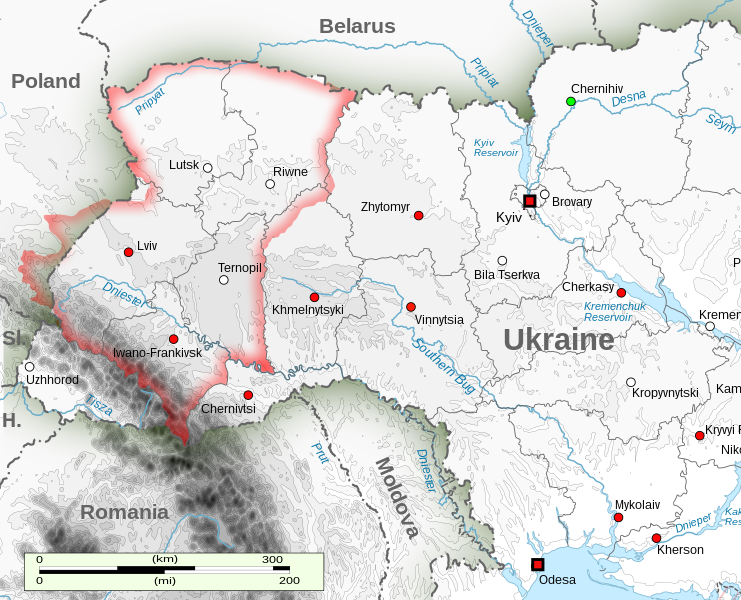It's not about "ancient hatreds"
The different trajectories of the Ukrainian-Polish and Azerbaijani-Armenian conflicts show how politics affect historical memory and ethnic conflict.

The controversy around a Ukrainian Nazi veteran honored by Canada has touched on wounds no one wanted to reopen. Yaroslav Hunka was one of the many Ukrainian nationalists who fought for the SS-Galizien, a German proxy force during World War II, then emigrated to Canada after the war. During a speech by Ukrainian president Volodymyr Zelensky last week, Canadian speaker of parliament Anthony Rota pointed Hunka out in the audience, calling him “a Ukrainian hero.”
After media drew attention to Hunka’s Nazi connections, Rota resigned in embarrassment. Poland, meanwhile, has threatened to open an extradition case against Hunka. Encouraged by Nazi Germany, the SS Galizien and other Ukrainian nationalist forces had committed ethnic cleansing against Poles in what they considered Ukrainian territory. Although modern Ukraine and Poland are close friends, united by a fear of Russia, the memory of World War II is still a sensitive issue between the two nations.
At the same time that the war of words around the SS Galizien was unfolding, a war of bullets and bombs was concluding elsewhere in the former Communist world. Azerbaijan toppled the Armenian separatist republic of Karabakh, ending a thirty-year war that had begun with the Soviet collapse. Fearing a repeat of the violent ethnic cleansing that Azerbaijan unleashed in 2020, most of the Armenian population has fled Karabakh.
The Ukrainian-Polish and Azerbaijani-Armenian conflicts are both rooted in historical grievances, which were frozen when all of those nations fell under Soviet domination. But they’ve taken drastically different trajectories. Poland and Ukraine have tried to deal with the memory of World War II through delicate diplomacy. Azerbaijan and Armenia, meanwhile, have kept their grievances live through decades of hot war. For all the talk about “ancient hatreds,” it goes to show that ethnic conflict is a political choice.
Central and Eastern Europe were integrated into the wealthy West after the Soviet collapse. Those countries fell under the NATO security umbrella, and were allowed to share the economic spoils of the European world, even if the distribution hasn’t been entirely fair. Meanwhile, Russia’s threats (and later attacks) against Ukraine fostered a sense of regional solidarity. Rather than World War II, which pitted Central/Eastern Europeans against each other, the main trauma of the region became “Soviet imperialism,” which all Central/Eastern Europeans can claim to be victims of.

Secure and prosperous, Poland has no reason to press its historic claims on places like Lviv. Although the Soviet Union permanently chopped off part of Polish territory — giving some to Ukraine, some to Belarus, and some to Lithuania — it also “compensated” Poland with German territory. And although Poland has been angered by Ukrainian nationalists whitewashing Nazi collaborators, neither Poland nor Ukraine wants to jeopardize the common front against Russia for the sake of decades-old history.
Hungary, another country that lost much of its historic territory to other Eastern European states, has made a lot of domestic noise about reuniting with historic Hungarian communities. Yet the Hungarians in Romania’s Transylvania and Ukraine’s Transcarpathia have mostly fought their battles through legal channels, instead of guns from the “motherland.”
The South Caucasus took a very different path. Azeris and Armenians had grievances against each other dating back to the 1905 and 1917 civil wars. Fighting over the post-Soviet borders began even before the Soviet Union was officially dissolved. The Karabakh War of the 1990s featured war crimes by both sides, including anti-Armenian pogroms in Baku and the mass expulsion of Azeris from Karabakh. Azerbaijan nursed its grudges, as the Azerbaijani government built an entire national identity around revenge for Armenian atrocities (real and imaginary) from decades past.
Foreign powers have exploited the Azerbaijani-Armenian conflict. Russia has played both sides to boost Russian influence. Israel has built up Azerbaijan’s military in exchange for access to the Iranian border. The West has tried to court Azerbaijan as an ally, although its options are limited by pro-Armenia sympathy among Western publics. Iran has engaged in a mirror-image of that policy, trying to protect Armenia’s independence without angering the Iranian Azeri public.
Some of these differences are due to geopolitical factors outside anyone’s control. Azerbaijan and Armenia were smaller, poorer countries than Poland and Ukraine in 1991. European-style integration was simply not on the cards for the South Caucasus. Other differences are due to decisions by Soviet and post-Soviet elites. The old Communist nomenklatura of Baku and Yerevan held onto power after independence by “converting to nationalism.” KGB officers and party bureaucrats in both capitals remade themselves as the defenders of national honor.
Either way, ethnic conflict is not an unstoppable force of nature, and trauma is not an immovable object. Under some circumstances, the violence of the past begets more violence in the future. And under other circumstances, bitter memories are just that: memories.


